|
|
|
Sort Order |
|
|
|
Items / Page
|
|
|
|
|
|
|
| Srl | Item |
| 1 |
ID:
128987
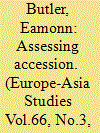

|
|
|
|
|
| Publication |
2014.
|
| Summary/Abstract |
On 1 May 2014, the European Union (EU) celebrated the tenth anniversary of the accession of ten member states-Cyprus, Czech Republic, Estonia, Hungary, Latvia, Lithuania, Malta, Poland, Slovakia and Slovenia. Of these ten new members, eight were Central and East European (CEE) countries that had, for most of the twentieth century, been governed by communist regimes either as republics of the Soviet Union (Latvia, Lithuania and Estonia), satellite states of the Soviet Union (Poland, Hungary, Czech Republic, Slovakia) or as a constituent republic of Yugoslavia (Slovenia). In the subsequent ten years three additional post-communist countries have acceded to the EU (Romania and Bulgaria in 2007 and Croatia in 2013). Commenting on the 2004 EU accession of the first eight former communist countries, the then Irish Prime Minister and President of the European Council, Bertie Ahern, wrote that there was
a particular historical resonance as eight of the former communist countries in the east have emerged from the shadows of the Iron Curtain to join us in working for common goals and for mutual benefit. The artificial divisions, which have blighted our continent's history for so long, are finally being laid to rest.1
|
|
|
|
|
|
|
|
|
|
|
|
|
|
|
|
| 2 |
ID:
114193


|
|
|
|
|
| Publication |
2012.
|
| Summary/Abstract |
Divorce legislation was enacted in Malta in 2011 following a consultative referendum. Until then the biggest barrier to divorce had been the perceived influence of the Catholic Church, expressed not just in its presence in many spheres of public life, but in historical reminders of the political costs of challenging its status and doctrines. The process leading to the introduction of divorce showed: that the political parties still feared confronting the Church; that the Church itself had been losing ground as a politically coercive or persuasive force; and that the biggest challenge to its status and relevance was coming from below, as a result of people's changing attitudes and lifestyle. This contrasts starkly with the history of Church-State relations and its landmark political-religious conflicts, involving the ecclesiastical establishment on the one hand, and secularising political forces on the other. Retracing the history of political-religious strife, this paper seeks to evaluate the changing quantity and quality of ecclesiastical power in Malta, up to the point when the divorce question exposed its limits, though not its end.
|
|
|
|
|
|
|
|
|
|
|
|
|
|
|
|
| 3 |
ID:
130685
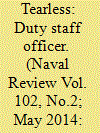

|
|
|
| 4 |
ID:
011460


|
|
|
|
|
| Publication |
Dec 1996.
|
| Description |
430-450
|
|
|
|
|
|
|
|
|
|
|
|
|
|
|
|
| 5 |
ID:
181776


|
|
|
|
|
| Summary/Abstract |
The Covenant of Mayors (CoM) is an initiative that voluntarily engages municipalities to devise local policies to reduce CO2 emissions and energy consumption. The progress of the CoM in Malta and Gozo is evaluated; evidence suggests that signatories have not sufficiently fulfilled their obligations to the initiative and there has been little contribution of the CoM to the local reduction of CO2 emissions and energy consumption for the 2020 set of targets for Malta. Overall, it was noted that local councils have not had sufficient autonomy, resources and external support to enable their successful participation in the initiative. The barriers experienced by Maltese signatories have been identified as ineffective communication and lack of resident engagement. With the large potential for local governments to contribute towards climate change mitigation and adaptation, certain policy recommendations are made to improve the effectiveness of local governments’ involvement in climate policies and initiatives. These measures focus on the financing of local councils, organisational and accountability procedures, prioritisation of climate action, outreach and involvement of the general public, and continued awareness raising of climate issues.
|
|
|
|
|
|
|
|
|
|
|
|
|
|
|
|
| 6 |
ID:
093465
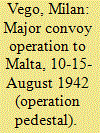

|
|
|
| 7 |
ID:
104177
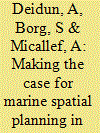

|
|
|
|
|
| Publication |
2011.
|
| Summary/Abstract |
Marine spatial planning (MSP) has been gaining in stature recently as an ecosystem-based tool for the management of marine space that promotes the sustainable and optimal use of resources with minimal stakeholder conflicts. Malta is the quintessential maritime nation, with a disproportionately large marine area compared to its terrestrial area. Nonetheless, its limited coastline, a considerable portion of which is inaccessible, poses inevitable conflicts between multiple marine activities and designations, including aquaculture, fishing, bunkering, coastal tourism, navigation, renewable energy installations, conservation of biological diversity and protected areas (on ecological criteria). This article makes the case to implement MSP-based policies and an applicable legal framework in the Maltese Islands.
|
|
|
|
|
|
|
|
|
|
|
|
|
|
|
|
| 8 |
ID:
109008


|
|
|
| 9 |
ID:
100102


|
|
|
| 10 |
ID:
120611
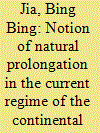

|
|
|
|
|
| Publication |
2013.
|
| Summary/Abstract |
The juridical continental shelf (CS), in terms of Article 76(1) of the United Nations Convention on the Law of the Sea (the LOS Convention), relies for its existence on the presence of a continental margin, which in turn depends on the existence of a natural prolongation. This is the principle expounded by this article, in the light of the provisions of Article 76(1) and (3) of the LOS Convention and other types of evidence of State practice. The prolongation, being geological in nature, is a necessary element underlying any claim to a juridical CS. Thus, in litigations, evidence must be led of its existence in support of such a claim. Even if the degree of influence exerted by the doctrine of natural prolongation upon the entitlement to the juridical CS and the delimitation of that entitlement between opposite or adjacent States are yet to be made clear in practice, the doctrine still has a separate life, of increasing importance, in today's legal regime of the CS. This is said in spite of the International Court of Justice (ICJ) judgment in Libya/Malta that emphasizes the distance criterion in respect of the continental shelf within 200 nm. The International Tribunal for the Law of the Sea (ITLOS) judgment in the recent Bangladesh/Myanmar delimitation case has provided an interesting interpretation of the notion of natural prolongation, and implicitly confirmed the relevance of the notion to the entitlement to the continental shelf in question. The case law in this regard has been significant, but other categories of State practice are also evolving that may underlie a new trend of giving the notion of natural prolongation a renewed, prominent place in this field.
|
|
|
|
|
|
|
|
|
|
|
|
|
|
|
|
| 11 |
ID:
087852


|
|
|
|
|
| Publication |
2009.
|
| Summary/Abstract |
Located at the southernmost tip of Europe, just off the coast of Africa, Malta has during recent years increasingly come into the international spotlight as a frontline state for irregular migration from Africa toward the European Union. Even though, in absolute terms, the number of seaborne migrants landing on the island has been rather modest, given the country's small size and very high population density, illegal immigration has become one of Malta's top policy priorities, nationally as well as on the EU level, and it has been calling for more support and burden-sharing mechanisms from other EU countries. This essay offers a broad overview of the migration issue as it has been unfolding in Malta during recent years, ranging from the main trends in irregular immigration, asylum issues, and the country's strict and contested detention policy to integration issues and the growth in anti-immigrant movements in Malta.
|
|
|
|
|
|
|
|
|
|
|
|
|
|
|
|
| 12 |
ID:
127863


|
|
|
|
|
| Publication |
2013.
|
| Summary/Abstract |
In a sign of rising frustration among states without nuclear weapons at the slow pace of disarmament efforts, the UN's disarmament committee in New York passed a resolution in November with the support of 129 states calling for the "urgent" start of multilateral negotiations to eliminate nuclear weapons and designating Sept. 26 as the international day for their "total elimination." "Our delegations joined the call of the overwhelming majority of states for more urgency, focus, and new momentum for nuclear disarmament," Ireland's representative said after the Nov. 4 vote, also speaking on behalf of Austria, Liechtenstein, Malta, New Zealand, and San Marino.
|
|
|
|
|
|
|
|
|
|
|
|
|
|
|
|
|
|
|
|
|